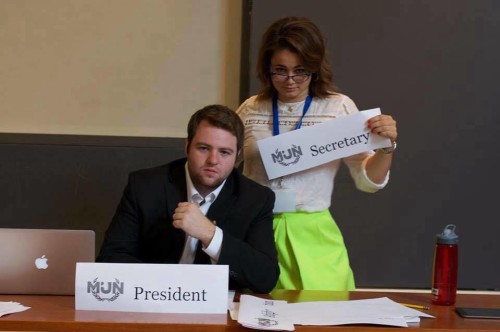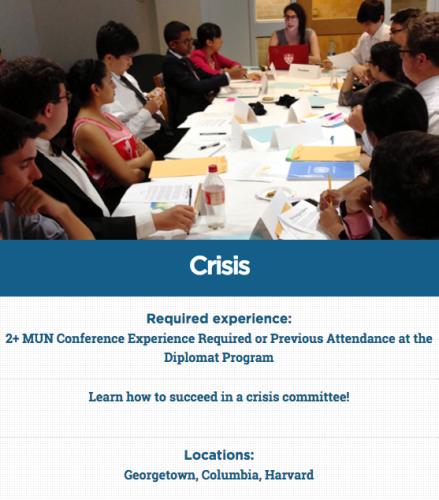
Our Model UN Institute Diplomacy Fellows know you’ve made a mistake when you forgot to create a crisis arc
The circuit is about to start again and one of the first major conferences to take place is the Columbia Model United Nations Conference and Exposition (CMUNCE). The thought of CMUNCE, an all-crisis committee conference, reminded me of one time I sat in committee to liveblog and observed a delegate make a clear mistake that took her out the crisis arc and obviously out of the running for awards. Thinking more broadly, here are five common mistakes in crisis committees that I have seen delegates make while observing committee:
1. Not Participating in Unconventional Crises
At CMUNCE, I saw crisis throw a math problem at the delegates and they had to solve it in order to proceed in committee. It did not seem like the committee’s strength, but one delegate blurted out “I hate math” and sulked. The best delegates, on the other hand, got up on the board and tried to work out the math and asked for feedback from their peers, even if they could not solve the problem.
Crisis updates may not necessarily always be straightforward, factual news updates. When it isn’t, and when it is frustrating, it’s important to stay in character and at least try.
2. Going Against the Crisis Arc
At the Model UN Institute this past summer, I saw several delegates repeatedly try to implement an assassination even though crisis staff kept sending notes back causing their attempts to fail.
When crisis staff does not want something to happen, don’t fight with them! Crisis is God, and your plans simply do not fit into the bigger picture of the crisis arc or were likely not scaffolded correctly (i.e. you can’t just suddenly pull something off without setting up the proper resources and scenario). Change course and try something else instead.
3. Not Covering Your Tracks When Doing Covert Operations
At ILMUNC, I saw a delegate who was strategizing his dark knight covert crisis arc — this means he’s working secretly against the committee. He kept creating more chaos and was powerful at first, but the committee eventually figured out that he was a double agent and he lost his standing in committee. That’s because he forgot to cover his tracks.
Covert operations should always be covered. Set up decoys, moles, security, scapegoats, hired help, situational triggers, or whatever you need to ensure that your directive does not leak or make it plausible that it came from you. And dark knight strategy needs to have a good set up starting the the beginning of committee, otherwise you may think you’re playing the committee but really crisis is just playing with you for a little bit before they choose to embarrass you to your peers.
4. Getting caught up in a subplot
Also at ILMUNC, I saw a delegate who was excited that he was playing a leading role in committee during one of the sessions, but he expressed doubts at how he would keep it going. It turned out that the committee session was only focusing on a particular subplot, and during the next session the committee turned its attention toward something else. His role no longer became relevant in committee.
The art of creating a crisis arc is to shape the grand strategy or central tension or thesis of the committee — what’s the overall storyline and where is it going? Most delegates who have done crisis at least once or twice should be able to get a general sense of the crisis arc, even if they have not figured it out. Some updates are part of the main plot, whereas others are subplots meant to distract the committee.
5. Not Researching Outside the Background Guide
Also at the Model UN Institute, a saw crisis staff have a group claim responsibility for a bombing. This group is pretty obvious to anyone who has studied the country they operate in. But because it was not mentioned in the background guide, no one knew anything about them or what kind of ethnicity or religion this group belonged to. It was a missed opportunity to stand out when crisis threw a curve ball.
One of the best ways to stand out in committee is to bring in outside information that may not have been mentioned in the background guide. All types of real events and actors are fair game in a crisis — the crisis world is much broader than what the Chair could capture in a background guide. Make sure to study your world (e.g. your cabinet’s country) as in depth as possible.
**
Good luck to all the delegates participating at Model UN conferences this winter and spring! For those who are interested in crisis training, the Model UN Institute Crisis Programs are offered at Georgetown, Columbia, and Harvard this summer.


